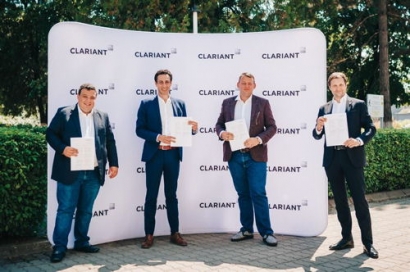
Eta Bio has been recently established with the purpose to construct, own and operate a full-scale commercial plant for the production of cellulosic ethanol from agricultural residues. For Clariant, the announcement of its fourth license agreement keeps the momentum for its innovative and sustainable Sunliquid technology going and represents another significant step towards its commercialization.
“Our Sunliquid technology is trendsetting for the development of sustainable and advanced biofuels. The continued success strongly demonstrates that our technology meets the market needs for sustainable solutions and gives us a competitive edge,” said Hans Bohnen, Clariant’s chief operating officer.
“After signing license agreements with first-generation ethanol producers, as well as mineral oil players, we are excited to also gain a foothold in another important customer segment – the agricultural sector – with our Sunliquid technology”, adds Christian Librera, Clariant’s head of Business Line Biofuels and Derivatives.
Eta Bio will perform the project development and plant operation at a greenfield site in General Toshevo, the Northeastern region of Bulgaria, utilizing available land, owned by company founders, the Pavlovi family. The annual production capacity is planned to be 50,000 tons of cellulosic ethanol, processing around 250,000 tons of wheat straw, which is an abundant resource in the region, also known as the granary of Bulgaria.
“The realization of the first Bulgarian cellulosic ethanol production project will help to solve one of the main challenges agricultural producers face in the region – the removal of the straw from the fields. This project will give us the chance to have an additional revenue stream from agricultural leftovers,” emphasized Kiril Pavlov, managing director of Eta Bio.
By using locally sourced feedstock, greenhouse gas savings can be maximized and additional business opportunities along the entire value chain will arise.
For Bulgaria, this constitutes an essential investment in green, sustainable technologies. The produced cellulosic ethanol will be used as a gasoline additive to fulfill the country’s blending mandate for advanced biofuels, as laid out in the Renewable Energy Directive (RED) II.
The project is comprised of a license of a Sunliquid basic engineering package, the provision of technical services, as well as the supply of starter cultures from Clariant’s proprietary enzyme and yeast platform to process Eta Bio’s feedstock into cellulosic ethanol.

